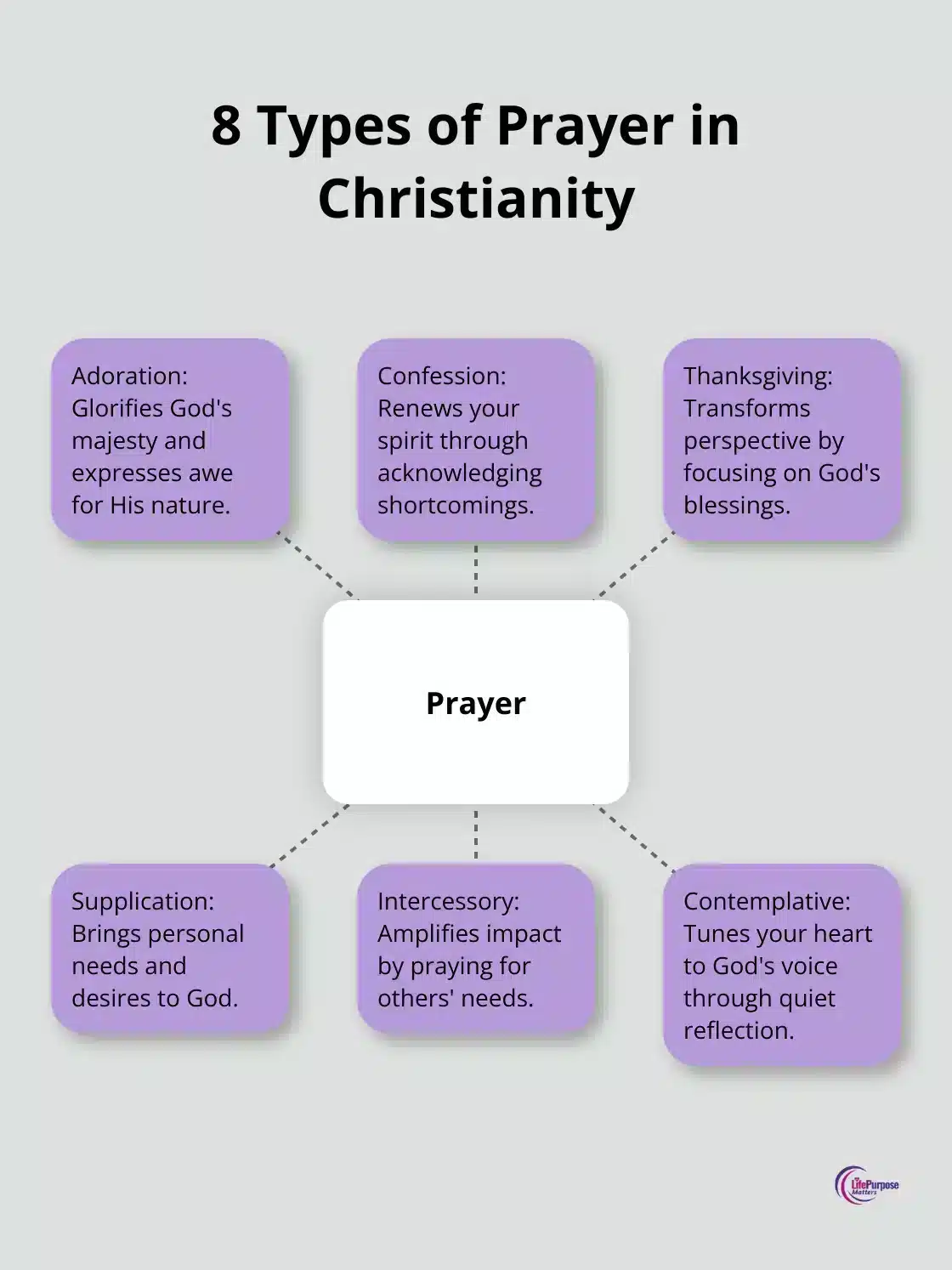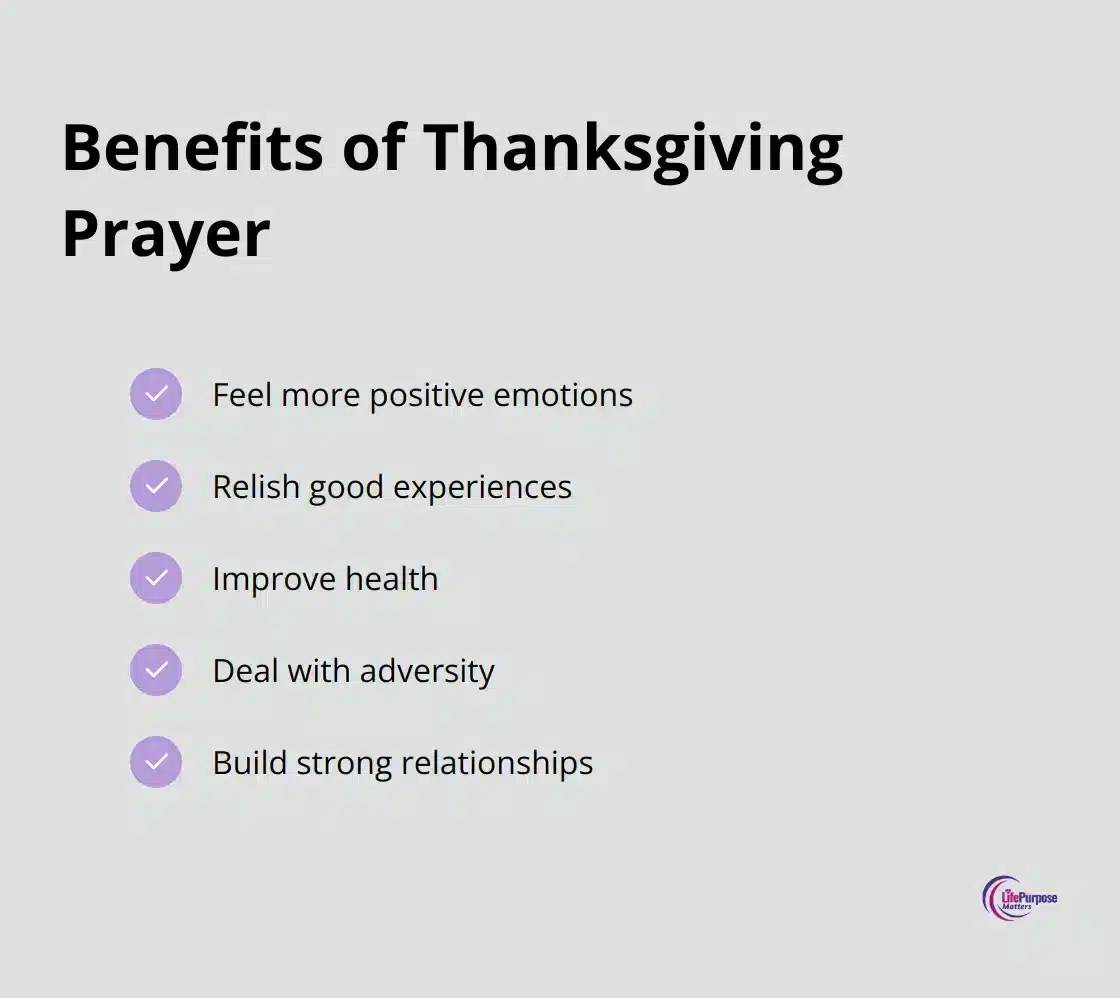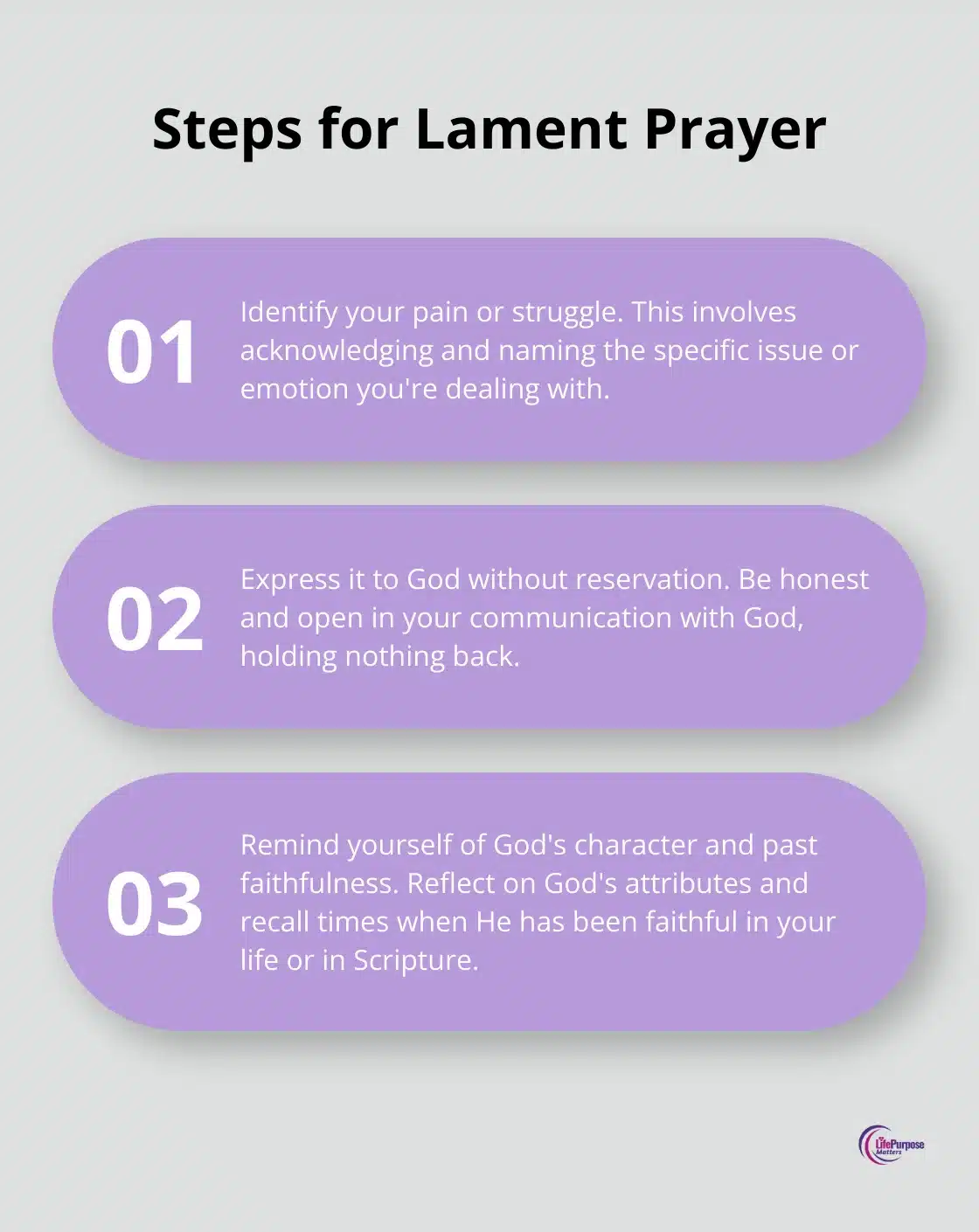Have you ever felt like your prayer life could use a boost? At Life Purpose Matters, we believe that exploring different types of prayer in Christianity can transform your spiritual journey. Prayer isn’t one-size-fits-all. It’s a rich tapestry of communication with God, each type serving a unique purpose in deepening your faith.
Table of Contents
ToggleLet’s dive into eight powerful ways to connect with the Divine and watch your relationship with God flourish.

1. Adoration Prayer Glorifies God’s Majesty
Adoration prayer focuses on God’s greatness and expresses our awe and love for Him. It’s a moment to appreciate God’s incredible nature without asking for anything in return. The Bible provides numerous examples of adoration prayers, such as Psalm 8, where David marvels at God’s creation and proclaims, “Through the praise of children and infants you have established a stronghold against your enemies, to silence the foe and the avenger.”
To incorporate more adoration into your prayer life, set aside time each day to concentrate solely on God’s character. Start by listing His attributes:
- Love
- Power
- Wisdom
- Faithfulness
Express your wonder and appreciation for each one. Use Scripture as inspiration for adoration (read a Psalm or a passage that describes God’s nature, and let those words inspire your own expressions of praise). Adoration doesn’t require fancy words; it’s about a heart full of love and reverence for our incredible God. As you practise adoration prayer, you’ll find your relationship with God deepens, leading naturally to the next type of prayer: confession.
2. Confession Prayer Renews Your Spirit
Confession prayer is a powerful way to clear your conscience and strengthen your relationship with God. Find a quiet place where you won’t be disturbed. Take a few deep breaths and ask the Holy Spirit to reveal areas in your life that need addressing. Be specific in your confession, acknowledging not just actions but also thoughts and attitudes that don’t align with God’s will. After you confess, express your genuine desire to change and ask for God’s help in overcoming these struggles.
Confession isn’t about feeling guilty; it’s about experiencing God’s forgiveness and renewal. As you make confession a regular part of your prayer life, you’ll likely notice a lightness in your spirit and a closer connection to God. This practise can lead to greater self-awareness and a deeper understanding of God’s grace. Don’t feel discouraged if you confess the same things repeatedly; growth is a process, and God’s patience is endless (His love for you is infinite!). Consistently bring your shortcomings to God and invite His transformative power into your life. As you embrace the cleansing power of confession, you’ll find yourself naturally moving towards a heart of gratitude, which leads us to our next type of prayer: thanksgiving.
Remember to start your day by focusing on renewing your mindset in Christ and listening to His guidance. This practise can help you maintain a spirit of confession and openness to God’s transformative work in your life.
3. Thanksgiving Prayer Transforms Your Perspective
Gratitude in prayer changes the game. It shifts our focus from what we lack to the abundance God provides. The Bible overflows with examples of thanksgiving, such as Philippians 4:6-7, where Paul urges us to “pray about everything. Tell God what you need, and thank Him for all He has done.” This practise not only benefits us spiritually but also improves mental health and overall well-being. Thanksgiving prayer has the power to transform lives through the simple act of giving thanks, helping people feel more positive emotions, relish good experiences, improve their health, deal with adversity, and build strong relationships.

To enhance your thanksgiving prayers, try these practical tips:
- Keep a gratitude journal: Write down three things you’re thankful for daily
- Turn complaints into praise: Stuck in traffic? Thank God for a moment of quiet reflection
- Use music: Start your day with worship songs or create a playlist of gratitude-filled hymns
Thanksgiving isn’t reserved for good times; it’s a powerful tool for all seasons of life. It helps maintain a positive outlook and deepens our trust in God’s faithfulness. As you cultivate a heart of gratitude, you’ll find yourself naturally moving towards bringing your requests to God, which leads us to our next type of prayer: supplication.
4. Supplication Prayer Brings Your Needs to God
Supplication prayer opens a direct line to God for personal requests. It involves humbly presenting your needs and desires to your Heavenly Father. When you approach God with supplications, be specific and honest. Tell Him exactly what’s on your heart, whether it’s a job opportunity, healing for a loved one, or guidance in a difficult situation. The key is to balance your requests with trust in God’s wisdom and timing. After you express your needs, end your prayer with “Your will be done,” echoing Jesus’ prayer in the Garden of Gethsemane. This attitude demonstrates faith and surrender to God’s perfect plan.
God isn’t a cosmic vending machine; He’s a loving Father who wants to provide for His children but also knows what’s best for them in the long run. As you practise supplication prayer, you’ll find it strengthens your relationship with God and helps you align your desires with His will. This alignment often leads to a natural progression in your prayer life, moving from personal requests to a broader focus on the needs of others. The next type of prayer we’ll explore, intercessory prayer, takes this outward focus even further, allowing you to stand in the gap for those around you.
5. Intercessory Prayer Amplifies Your Impact
Intercessory prayer lets anyone connect with God by praying for others. Its beauty lies in being inclusive, allowing everyone to contribute to the spiritual well-being of others. To practise effective intercession, create a prayer list of people and situations that need divine intervention. Set aside dedicated time each day to pray through this list. Visualise each person or situation as you present them to God. Be specific in your requests and align them with Scripture whenever possible. For example, when praying for a friend’s healing, you might reference James 5:14-15, which speaks about the prayer of faith for the sick.
Intercessory prayer transforms both the pray-er and those being prayed for. It cultivates empathy, broadens perspective, and strengthens our sense of community. As we consistently lift others up in prayer, we become more attuned to the needs around us and more willing to be part of the answer to those prayers. This practise often leads to tangible actions of love and support, creating a ripple effect of positive change in our communities. Intercessory prayer doesn’t require perfection, but persistence. Even without immediate results, trust that God hears and responds according to His perfect will and timing. As you develop this outward-focused prayer habit, you’ll find yourself naturally transitioning to a more inward, reflective form of communication with God – contemplative prayer.
6. Contemplative Prayer Tunes Your Heart to God’s Voice
Contemplative prayer offers a powerful method to quiet your mind and listen for God’s gentle whispers. Set aside 10 minutes daily in a quiet, comfortable spot where you won’t face disturbances. Close your eyes, take deep breaths, and focus on a simple phrase like “Jesus, I trust in you” or a short Bible verse. Repeat this phrase slowly in your mind, and let go of other thoughts as they arise. If your mind wanders, gently redirect your focus back to your chosen phrase.
Regular practise of contemplative prayer can lead to decreased anxiety and increased positive mood. Many Christians report feeling more attuned to God’s guidance and experiencing a deeper sense of His presence throughout their day. To enhance your practise, try using a prayer app like Pray As You Go (which offers guided contemplative sessions). The goal isn’t to achieve a perfect, thought-free state, but to create space for God to speak to your heart. As you make contemplative prayer a cherished part of your spiritual routine, you’ll find yourself naturally drawn to express praise and worship, which we’ll explore in our next section.
7. Praise Prayer Celebrates God’s Goodness
Praise prayer actively celebrates God’s character and deeds, focusing on what He does rather than just who He is. The Psalms offer numerous examples of praise prayers, such as Psalm 150, which exuberantly calls for praising God with various instruments and dance. To incorporate more praise into your daily spiritual practise, set aside a few minutes each morning to recount God’s recent blessings in your life. Use worship music as a catalyst for praise; create a playlist of uplifting songs that remind you of God’s goodness and listen to it during your commute or while doing chores.
A practical way to cultivate a habit of praise is to keep a praise journal. Each day, write down one specific way you’ve seen God work in your life or in the world around you. This practise trains your mind to notice and celebrate God’s ongoing activity. Praise isn’t just for the good times; it’s a powerful spiritual weapon in difficult seasons too. When you face challenges, intentionally shift your focus from your problems to God’s faithfulness, power, and love. This act of faith-filled praise can dramatically change your perspective and invite God’s peace into your situation (even in the midst of turmoil). As you develop a lifestyle of praise, you’ll find yourself better equipped to handle life’s ups and downs, including times of deep sorrow or pain, which leads us to our next type of prayer: lament.
8. Lament Prayer Transforms Pain into Trust
Life isn’t always easy, and God understands that. Lament prayer provides a way to express raw emotions to God during difficult times. It’s not about complaining; it’s about honest expression of pain while affirming trust in God’s goodness. The Bible contains numerous examples of lament, particularly in the Psalms. Psalm 13 showcases David’s cry, “How long, O Lord? Will you forget me forever?” Yet he concludes with, “I will sing the Lord’s praise, for he has been good to me.”
To practise lament prayer, follow these steps:

This process can lead to deep healing and transformation. Regular lament prayer often results in stronger faith and improved ability to navigate life’s challenges. God welcomes your pain and anger; He wants you to bring everything to Him. As you embrace lament as part of your prayer life, you’ll discover a new depth in your relationship with God and a greater capacity to find hope in the midst of suffering (even when circumstances seem bleak).
Wrapping Up
We’ve explored eight powerful types of prayer in Christianity, each offering a unique way to connect with God. These prayer styles cover the full spectrum of our spiritual experiences, from awe-inspiring adoration to raw honesty in lament. Prayer isn’t about perfection; it’s about connection. Try different prayer types in your daily routine and see what resonates with you.
The beauty of diverse prayer keeps our spiritual life fresh and dynamic. It’s like having a toolbox full of different ways to talk to God, each one perfect for different situations and emotions. At Life Purpose Matters, we believe that exploring these types of prayer can transform your relationship with God (and help you discover His purpose for your life).
Don’t fear stepping out of your prayer comfort zone. Try a new type of prayer and be patient with yourself as you learn. God delights in every sincere attempt we make to connect with Him, regardless of the form it takes. Your prayer life is a journey, not a destination.

